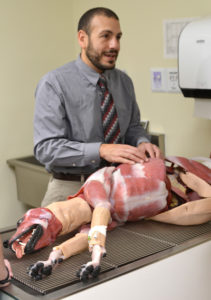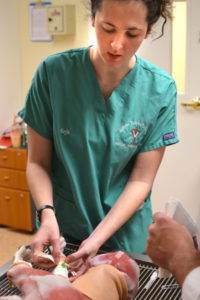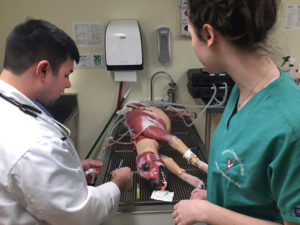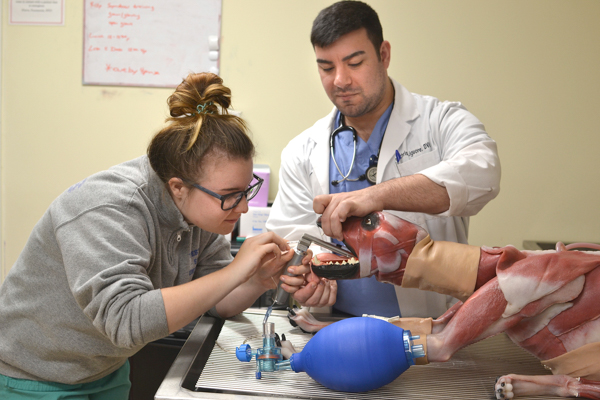 Dec 5, 2017 – Middlesex Community College veterinary technology students are the first technician students in the nation to practice clinical skills on a SynDaver canine educational device. Chris Gargamelli, DVM, the program’s coordinator, introduced the lifelike synthetic model to the students in their clinical labs at Pieper Veterinary Hospital in Middletown last week.
Dec 5, 2017 – Middlesex Community College veterinary technology students are the first technician students in the nation to practice clinical skills on a SynDaver canine educational device. Chris Gargamelli, DVM, the program’s coordinator, introduced the lifelike synthetic model to the students in their clinical labs at Pieper Veterinary Hospital in Middletown last week.
According to the manufacturer, SynDaver Labs in Tampa, the realistic synthetic canine includes every bodily structure and anatomical component that is found in a living dog, including realistic skin, fat, bones, muscles, ligaments, joints, and bodily systems. The 35-pound generic breed dog, dubbed “Scooby” by the company, is made from a mixture of water and synthetic fiber and controlled by a pump using a mobile application.
“Before, the program didn’t have enough well-behaved patients for our students to learn clinical skills. We also want our students to be proficient in these hands-on skills before performing them on a live animal,” explained Professor Gargamelli. “With the synthetic canine, students can practice drawing blood, inserting IV catheters, intubatation, taking X-rays, and even obtain urine.”
Kayla Litke, a second-year veterinary technology student from Wethersfield, along with her classmates, is enthusiastic about learning vet tech skills by using the sophisticated canine device. “I love it. I’ve never worked with anything like this before,” she stated after taking its pulse and inserting an IV into the dog’s front paw.
 While similar synthetic canines are also used to practice surgical procedures at veterinary medical schools, cost often prohibits vet tech schools from purchasing the $35,000 device. Middlesex Community College is grateful to receive special funding for the SynDaver from the Perkins Career and Technical Education Grant, which supports technical endeavors that prepare students to become more competitive in the workforce.
While similar synthetic canines are also used to practice surgical procedures at veterinary medical schools, cost often prohibits vet tech schools from purchasing the $35,000 device. Middlesex Community College is grateful to receive special funding for the SynDaver from the Perkins Career and Technical Education Grant, which supports technical endeavors that prepare students to become more competitive in the workforce.
In its fifth year, the Middlesex veterinary technology associate degree program is accredited by the American Veterinary Medical Association Committee on Veterinary Technician Education and Activities. Currently, 24 students are enrolled through a selective admissions process. As described by the National Association of Veterinary Technicians in America, veterinary technicians are educated to be the veterinarian’s nurse, laboratory technician, radiography technician, anesthetist, surgical nurse, and client educator.
MxCC partnered with Pieper Veterinary Hospital for educational training in clinical labs and on specialized equipment. In the hospital’s recent expansion, three rooms were built specifically for MxCC to use as learning space in addition to access to the hospital’s library.
For more information about the MxCC vet tech program, visit https://mxcc.edu/catalog/academics/veterinary-technology/.
 For more about Pieper Veterinary, visit http://www.piepermemorial.com/.
For more about Pieper Veterinary, visit http://www.piepermemorial.com/.
Since 1966, Middlesex Community College has provided high-quality, affordable, and accessible education to a diverse population, enhancing the strengths of individuals through degree, certificate, and lifelong learning programs that lead to university transfer, employment, and an enriched awareness of our shared responsibilities as global citizens. A part of the Connecticut State Colleges and Universities system, MxCC offers more than 60 degree or certificate programs at the main 35-acre campus in Middletown, MxCC@Platt in Meriden, and online.
Dec. 4, 2017


